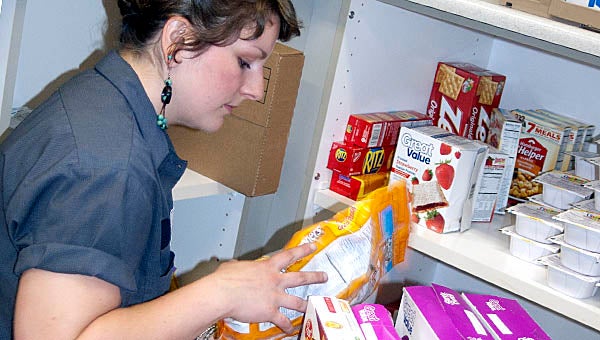Bridging the meal gap
Published 5:16 pm Friday, May 11, 2012

Sasha Colette, with the Huntington Area Food Bank, helps to stock the food pantry at Dawson-Bryant High School.
Huntington Area Food Bank and Dawson-Bryant High School team up for pantry
COAL GROVE ¬— Many high school students with after-school jobs work to make money for non-essentials, like movie tickets, make-up, music or a night out with friends.
But there are others, like Tyler Owens and Shawn McClaskey, who struggle to find work to afford themselves the very basic of necessities — food.
As 17-year-old Shawn puts it, “It’s hard to get a job anywhere anymore.”
Not getting along with his parents, Shawn was on his own for about a month, he said, working whatever odd jobs he could find to earn enough to eat.
Sixteen-year-old Tyler has a similar story. Financial problems at home left the ends of the months scarce for food. Tyler also works odd jobs to earn money to eat.
“I’d build, cut grass, anything,” Tyler said. “Anything you want me to do, I’ll do it.”
A common problem
Just like Tyler and Shawn, there are more than a few students at Dawson-Bryant High School who, for different reasons, are food insecure, meaning there are times when there is a lack of access to enough food to promote an active, healthy lifestyle.
“Nationally and locally, 1 out of 4 children are deemed to be food insecure,” said Scott Frasure, director of development at the Huntington Area Food Bank.
The impact, Frasure said, can cause students the inability to concentrate and perform in class. This in turn, can lead to economic problems for entire communities when those students enter the world after high school, unequipped to find jobs or enter college.
Executive director of the HAFB, Leigh Ann Zappin, said there has been a rise in food insecure students.
“I’m seeing kids today talking about couch surfing,” Zappin said.
The HAFB help provide food to 16 counties in the Tri-State, including Lawrence County.
In Greenup County, Ky., Zappin said she knew of a teenager who was living in a pull-behind camper in someone else’s yard, using a kerosene heater to cook with.
Other teenagers are left to fend for themselves while their parents work away from home, she said.
“I can’t imagine ever telling my kids there was nothing to eat,” Zappin said. “These kids are seeing that. On Monday morning, these kids run to the cafeteria because they haven’t eaten all weekend.”
Working on a solution
Dawson-Bryant English teacher Traci Musick has met and teaches many of these students who find themselves hungry. One in particular, she said, sold his most prized possession, his cell phone, to have enough money to buy food. Others would go home over the weekends and stay hungry until they returned to school on Monday.
“I just knew then we had to do something,” Musick said.
In October, Musick began contacting businesses, both locally and nationally.
Heiner’s Bakery agreed to donate two loaves of bread each week.
With that bread, Musick made bologna and peanut butter and jelly sandwiches for her last class of the day so they wouldn’t be hungry.
Musick and other teachers helped support the small program financially, but it was when she contacted Feeding America, the effort grew into something much bigger.
The food pantry
Feeding America, a national hunger-relief charity, put Musick in touch with the HAFB about a month ago.
Zappin said there was no doubt to set up a pantry at the school and got the ball rolling immediately.
Two weeks ago, the HAFB made its first delivery of food to the school and officially opened the school’s pantry.
The Dawson-Bryant pantry is the seventh pantry to open in Zappin’s HAFP district.
“We target schools where number of students who are using free and reduce breakfasts and lunches are the greatest,” Zappin said.
Zappin said Dawson-Bryant has the largest need of all seven pantries so far.
In the first couple of days the pantry was open at the school, 53 students took advantage of the program.
The school has provided a secure room for the food and students can ask any teacher if they need food.
Friday, Sasha Colette with the HAFB delivered the school’s third load of food, about 250 pounds.
Colette said a typical high school pantry would get about 150 pounds of food, but Dawson-Bryant’s is so utilized, “it’s good to bring a little extra.
The Coal Grove Leo Club also got involved with the pantry for their community service work. When deliveries arrive, Leo Club members help carry and stock the pantry shelves.
Leo Club member Anthony Pemberton said he helps stock the pantry and was surprised to learn that there was such a need for it in his school.
Leo Club adviser, Traci Hunt, said the pantry was important.
“Food needs must be met for learning can occur,” she said. “It may not be a today situation, but if it becomes a tomorrow situation (the pantry is available).”
Asking for help
Friends since elementary school, Tyler and Shawn make trips to the food pantry together. In fact, it was Tyler who first told Shawn about Musick and her willingness to help when he needed it.
“It started getting hard but then (Tyler) told me about this (pantry),” said Shawn. “They helped me out because I would come here and get food and save money to get food if I needed it.”
The friends know they are not the only ones who need help every now and then.
“There’s a lot of people out there that need help,” Tyler said. “They are too shy or scared. They are afraid they will get bullied or something. At least we know there are people out there who actually care about everybody else.”
“A lot of people just don’t show it,” Shawn agreed. “But me, if I need help, I don’t care who is around I’m going to ask for help if I need it. It means a lot to me just knowing that if I need something, it’s here.”
How to help
HAFB will donate to the pantry every few weeks or as needed, Zappin said. They will also coordinate a summer program so students won’t have to go without.
Musick said donations and sponsors are still needed to help the program thrive. Musick said she needed donations of small backpacks for students to carry food home in a discrete way.
Also, donations of hygiene supplies, like deodorant and body wash are needed.





